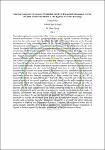| dc.contributor.author | Oder, Joshua | |
| dc.contributor.author | Etengu, Robert Oguti | |
| dc.contributor.author | Ejang, Mary | |
| dc.date.accessioned | 2023-04-04T10:04:13Z | |
| dc.date.available | 2023-04-04T10:04:13Z | |
| dc.date.issued | 2021 | |
| dc.identifier.citation | Oder, J., Etengu, R.O., and Ejang, M.(2021).Internal Corporate Governance Mechanism and Firm Financial Performance: A Case of Listed Commercial Banks at The Uganda Securities Exchange | en_US |
| dc.identifier.uri | http://ir.lirauni.ac.ug/xmlui/handle/123456789/572 | |
| dc.description.abstract | The study empirically examined the effect of internal corporate governance mechanism on the
financial performance of listed commercial banks at the Uganda Securities Exchange. In
particular, the study sought to: (1) establish the effect of board of directors on the financial
performance of listed commercial banks at the Uganda Securities Exchange; (2) assess the
information of audit committee on the financial performance of listed commercial banks at the
Uganda Securities Exchange; and (3) examine the effect of ownership structure on the financial
performance of the listed commercial bank at the Uganda Securities Exchange. The study
employed ex-post facto research design using a combination of cross-sectional and time series
data. Through the quantitative approach, the study examined balance panel data of five listed
commercial banks at the Uganda Securities Exchange for a period of seven financial years
(2012-2018). The study used mainly secondary data relating to corporate governance variables,
firm financial and market performance that was collected manually from the annual reports of
listed commercial banks. Primary data rating to internal corporate governance mechanisms and
financial performance was also collected through interviews in order to supplement the
secondary data. Analysis was done inform of descriptive statistics, correlations and regressions
using STATA 14. The study found firstly and foremost that the board of directors does not
significantly affect the financial performance of listed commercial banks at the USE as
measured by return on equity (ROE) and Tobin’s Q (-ratio). Secondly and on the basis of the
statistical results of the second hypothesis, the study found that the audit committee does not
significantly affect the financial performance of listed commercial banks at the USE as
measured by ROE and the Q-ratio. The study recommends the strengthening of the board of
directors and the audit committees of the listed commercial banks so as to ensure that they
provide adequate and sufficient time to pressing and current issues rating to their banks. In
addition, government and policy makers should create an environment that encourages
balanced investment for all the investors of especially the local banks irrespective of their
nationality so that the ownership of these banks does not only grow among a few individual
investors and companies but rather spread out reasonably to diversify and attract skills and
companies to improve their financial performance. Moreover, the regulatory bodies like the
capital markets authority (CMA) should mandate the corporate governance regulations in
Uganda to further improve the financial performance of listed commercial banks. | en_US |
| dc.language.iso | en | en_US |
| dc.publisher | Lira University | en_US |
| dc.subject | Internal Corporate Governance Mechanism | en_US |
| dc.subject | Corporate Governance | en_US |
| dc.subject | Firm Financiel Performance | en_US |
| dc.title | Internal Corporate Governance Mechanism and Firm Financial Performance: A Case of Listed Commercial Banks at The Uganda Securities Exchange | en_US |
| dc.type | Thesis | en_US |

